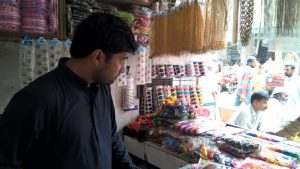Lahore: Mohsin looks after his father’s artificial jewelry business in Bolton Market, Karachi. Though young and energetic, he is scared to expand his business and feels content to run the small shop that his father inherited from his own father some 40 years back.
“Life is difficult in Pakistan. From where would I get the funds to expand the business?” said Mohsin.

Mohsin comes from a religious family. They cannot borrow money from the commercial bank on interest. Neither do they trust the Islamic banks, considered sham by Mohsin’s family.
“I am scared that if I encounter any financial problem, I would not be able to set my business again.”
Mohsin is young and energetic but without dreams. He adores former army chief General Pervez Musharraf and feels indebted to the Rangers in Karachi for returning peace to the city. He did not hide his disdain for the Muttahida Qaumi Movement (MQM). He equally dislikes the Pakistan People’s Party.
“Ever since the Rangers have taken control of the city, things have turned around. I do not even want to hear the name of MQM. Our business has picked up since the Rangers’ Operation began,” says Mohsin
Mohsin considers the Pakistan army a saviour. He believes that only the army can save the country from drowning. The present government of Sindh province has done nothing for the people of Sindh, he believes.
Customers coming to his shop are equally dejected about the present situation.
Maqsood Ahmed has come to buy stock for stalls that he is setting up for his 15 year old son Hussain Ahmed.
“We are six members in the family; I work in a factory. Half of my salary, Rs 6,000 goes in house rent. I need a helping hand,” Ahmed told News Lens Pakistan.
Hussain has been a school dropout. In primary education, 50 per cent of the children drop out from school before reaching the fifth grade. Parents usually feel the child is ready to help them earn additional money at age 10.
Poverty has taken a toll on their lives, ambitions and the ability to dream, Ahmed says.
“The government will do nothing for us. It is good for nothing. Prices of goods and services are rising while the purchasing power is going down.”
Moshin’s father, Noor Muhammad, has been selling imitation jewelry in this medium-sized overstuffed shop, at Bolton Market Karachi, for almost forty years.
Noor believes that the Sindh government’s economic policies have affected small business owners across most of the country.
He says most of his dealers are based in Lahore since he gets good rates from there. According to Noor labor is cheaper in Lahore than in Karachi.
“A pack of twelve earrings if it costs Rs 80 in Karachi, we easily get it at Rs 40 from Lahore,” Noor says.
Noor says many of his suppliers have closed down their businesses in Karachi because of the political unrest. The influx of Chinese goods has also wrought havoc in the market.
While Noor, Maqsood, and Moshin are striving to make their ends meet, the Sindh government is sitting in elegant homes in Dubai to decide how to lead the herds of 20 million people in Karachi.
Chairman of the All Karachi Tajir Ittehad, Atiq Mir praised the Rangers for cleaning up 30 years of debris in three years. He says the police led Rangers operation in Karachi has been Pakistan’s most successful action against criminals and thugs.
Mir, however, does not shy from taking credit in helping the military cleanse Karachi. He says that the business community has not only identified the criminal elements but also provided addresses of those who had been involved in extortion and kidnapping in Karachi.
Though Mir is contended with the Rangers’ performance, he is all dismayed over the provincial and federal government’s economic policies. To illustrate his disappointment he cites a comparative analysis of the profit Karachi’s business earned during this year and last years’ Eid.
“In 2015, Karachi made 70 billion rupees during Ramzan. In 2016, it could barely make Rs 45 billion,” he told News Lens Pakistan.
“This shortfall in profit was due to the withholding tax the government laid on the withdrawal of deposits from banks.”
He says investors have been wary of the government’s irregular fiscal policies.
“Reduction in the prices of oil never translates into reduced inflation. Unless the price of
electricity comes down, real change in the prices of commodities can never be felt,” Mir said.
He said the energy crisis and Sindh government’s anti-investment economic policies had taken the breath out of small business people, leaving them too scared to expand and take risks.



